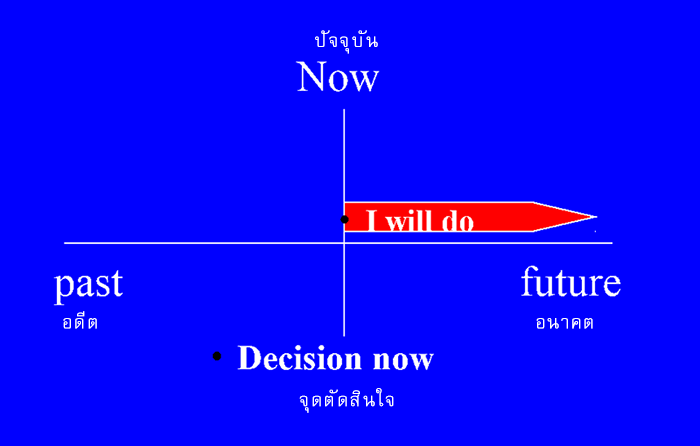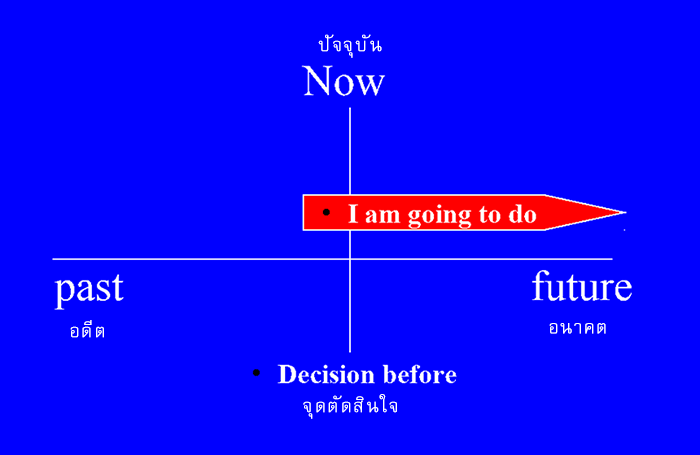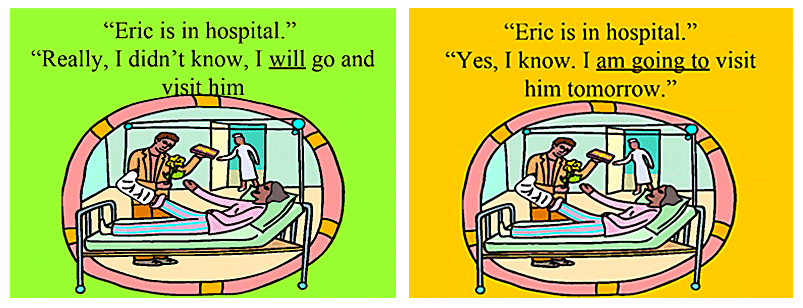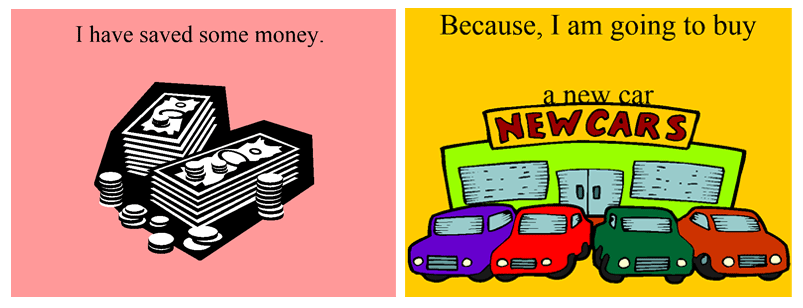การใช้ play do go: นี่คือโพสต์ที่เกี่ยวข้องกับหัวข้อนี้
Preposition คือ คำบุพบท ที่ใช้เชื่อมคำนาม สรรพนาม หรือคำกริยา ของประโยค เพื่อบ่งบอกสถานที่ทิศทาง เวลา วิธีการ หรือเหตุผล โดย Preposition นั้นมีความสำคัญต่อการเข้าใจพื้นฐาน English Grammar เช่น การแต่งประโยค เพราะคำบุพบทมีหน้าที่คอยเชื่อมโยงประโยคให้สมบูรณ์
ตัวอย่างคำบุพบท เช่น
at in on after about below between by down for from over under with without
Table of Contents
คำบุพบทแบ่งได้เป็น 3 ประเภท ดังนี้
- Preposition of Place คือ คำบุพบทบ่งบอกสถานที่
- Preposition of Direction คือ คำบุพบทบ่งบอกทิศทาง
- Preposition of Time คือ คำบุพบทบ่งบอกเวลา
Preposition of Place (คำบุพบทบ่งบอกสถานที่)
เป็นคำบุพบทที่บ่งบอกว่า คน สัตว์ สิ่งของ นั้น ๆ อยู่สถานที่ใดบ้าง ซึ่งส่วนใหญ่จะใช้ in on at หรือ between โดยจะอธิบายวิธีการใช้ให้เข้าใจดังนี้
In
มีความหมายว่า ใน ซึ่งหมายถึงภายในสิ่งสอง, ในภาชนะ, ในชมรม, ในเมือง, ในทะเล เป็นต้น
ตัวอย่างประโยค ดังนี้
They are in the Money Club.
We keep clothes in a closet.
I live in Bangkok.
On
มีความหมายว่า บน ซึ่งหมายถึง บนพื้นของวัตถุบางอย่าง
เช่น on the floor, on the street, on the table เป็นต้น
ตัวอย่างประโยค ดังนี้
His house is on Silom Road.
What city is on the Chao Phraya River.
At
มีความหมายว่า ที่ ซึ่งหมายถึง คำที่ใช้กับพื้นที่หรือสถานที่นั้น ๆ อย่างเจาะจงให้แน่ชัด
เช่น at home, at office, at station
ตัวอย่างประโยค ดังนี้
She studies at a university.
She works at an office.
Between
มีความหมายว่า ระหว่าง เป็นคำที่ใช้เมื่อต้องการบอกตำแหน่งที่อยู่ตรงกลางระหว่าง 2 สิ่ง เช่น แมว 2 ตัว, คน 2 คน, สถานที่ 2 แห่ง
ตัวอย่างประโยค ดังนี้
A part of the Mekong River is between Thailand and Laos.
The star is between the sky and the ground.
Preposition of Direction (คำบุพบทบ่งบอกทิศทาง)
เป็นคำบุพบทที่บ่งบอกทิศทางว่าจะไปทางไหน มาจากทางไหน หรือจากอีกที่หนึ่งมายังอีกที่หนึ่งเช่น
to (ถึง)
from (จาก + จุดเริ่มต้น)
into (เข้าไปข้างใน)
out of (ออกจาก)
down (ลง)
up (ขึ้น)
through (ผ่าน, ทะลุ)
ตัวอย่างประโยค ดังนี้
She always gets up at 6 o’clock.
Father lays a toy down on the floor.
Where are you from?
The police got out of their car.
He walked into the forest.
A butterfly flies through the door.
Preposition of Time (คำบุพบทบ่งบอกเวลา)
เป็นคำบุพบทที่บ่งบอกถึงการแสดงเวลา เช่น แสดงเป็นชั่วโมง วัน สัปดาห์ เดือน ปี ฤดูกาลต่าง ๆ หรือศควรรษ
โดยคำ Preposition of Time ที่เรามักจะเห็นกันบ่อย ๆ ได้แก่
at
in
on
during
from… to…
การใช้ On (วัน, เดือน)
We go playing football on Sundays.
I met her on a summer afternoon.
Mother’s Day is on August 12.
การใช้ In (ช่วงเวลา)
I will move to Bangkok in November.
She went to Japan in 2015.
My son was born in July.
การใช้ At (เวลา, ชั่วโมง, เวลาตามนาฬิกา)
I always have lunch at noon.
I wake up at 8 o’clock.
I have a meeting at 9 o’clock.
การใช้ During (a period of time)
หมายถึง ในระหว่าง มักจะอยู่หน้าช่วงเวลาหนึ่ง ๆ หรือในระหว่างช่วงเวลาการพักร้อน การประชุม หรือการแข่งขัน เป็นต้น
ตัวอย่างประโยค ดังนี้
We will be really busy during the next month.
During the meeting, Henry shared a lot of ideas.
What did you do during the last holidays?
การใช้ From… to…
ส่วนมากจะเห็นใช้กับช่วงเวลา เช่น จากช่วงเวลาหนึ่งไปหาอีกช่วงเวลาหนึ่ง
โดยมีวิธีเขียนดังนี้
from + จุดเริ่มต้น + to + จุดสิ้นสุด
ตัวอย่างประโยค ดังนี้
Students are usually in class from 08.30 A.M. to 03.30 P.M.
I travel from Bangkok to Chiang Rai
Not far from my house to your house.
Preposition หรือคำเชื่อม เป็นความรู้พื้นฐานที่ผู้เรียนภาษาอังกฤษทุกคนจำเป็นต้องทำความเข้าใจ เช่น การบ่งบอกถึงสถานที่ ทิศทาง และการบ่งบอกเวลา เพื่อเพิ่มความสามารถในการพูดหรือเขียนให้เชื่อมประโยคอย่างคล่องแคล่ว เราต้องฝึกฝนการใช้ Preposition ในชีวิตประจำวัน
ถ้าอยากรู้ทริคการเขียนจดหมายและอีเมลภาษาอังกฤษ เข้าไปอ่านต่อที่บทความ การเขียนอีเมลและจดหมายอย่างเป็นทางการ

[Update] การใช้ Will และ Going to | การใช้ play do go – NATAVIGUIDES
การใช้ Will และ Going to พบได้บ่อยครั้งในการใช้ภาษาอังกฤษ ในบทเรียนนี้จะอธิบายถึงการใช้ ทั้ง 2 คำนี้ว่ามีความเหมือนและแตกต่างกันอย่างไร พร้อมตัวอย่างประกอบที่เข้าใจได้ง่าย
ความหมาย
Will และ Going to มีความหมายเหมือนกันคือหมายถึง “จะ” ใช้เพื่อพูดถึงเหตุการณ์ที่จะเกิดขึ้นในอนาคต แต่ทั้ง 2 คำนี้มีจุดที่แตกต่างกัน
โครงสร้างประโยค
Will
Subject + will + v.1
Going to
Subject + be going to + v.1
***be = verb to be (is/am/are)
***v.1 = verb 1 (คำกริยาช่องที่ 1)
โครงสร้างประโยคของการใช้ Will และ Going to นั้นคล้ายกันคือ
ประธาน (Subject) ตามด้วย will หรือ be going to และตามด้วยคำกริยาช่องที่ 1 (v.1)
การใช้ Will และ Going to
- Will ใช้ในการบอกว่าจะทำ เป็นตัดสินใจโดยทันที โดยที่ไม่ได้คิดหรือวางแผนไว้ก่อน
- Will ใช้ในการคาดเดาหรือแสดงความคิดเกี่ยวเหตุการณ์ที่จะเกิดขึ้นในอนาคต
- Going to ใช้ในการพูดถึงเหตุการณ์ที่จะเกิดขึ้นในอนาคต โดยมีคิดหรือวางแผนไว้ก่อนแล้วว่าจะทำ
- Going to ใช้ในการพูดถึงสิ่งที่จะเกิดขึ้นในอนาคตค่อนข้างแน่นอน (มีหลักฐานหรือเหตุผลประกอบ)
แผนภาพแสดงความแตกต่างของ Will และ Going to
จากแผนภาพแสดงความแตกต่างของการใช้ Will และ Going to โดยที่ will นั้นเป็นการตัดสินใจโดยทันที ณ เวลาที่พูด โดยที่ไม่ได้คิดหรือวางแผนไว้ก่อน แตกต่างจาก Will ที่จุดที่ตัดสินใจคือจุดที่อยู่ก่อนเวลาที่พูด ซึ่งเป็นคิดหรือวางแผนไว้ก่อนแล้ว

จุดตัดสินใจของการใช้ Will

จุดตัดสินใจของการใช้ Going to
ตัวอย่าง #1

A: Eric is in hospital.
(Eric อยู่โรงพยาบาล)
B: Really, I didn’t know, I will go and visit him.
(จริงเหรอ ฉันไม่รู้เลย ฉันจะไปเยี่ยมเขา)
จากตัวอย่าง B ทราบข่าวว่า Eric อยู่โรงพยาบาลจาก A และพูดออกไปว่าจะไปเยี่ยมที่โรงพยาบาล เป็นการตัดสินใจโดยทันที ณ เวลานั้น เป็นการใช้ Will ในประโยคที่บอกว่าจะทำ โดยไม่ได้วางแผนไว้ก่อน
A: Eric is in hospital.
(Eric อยู่โรงพยาบาล)
B: Yes, I know. I am going to visit him tomorrow.
(ฉันทราบแล้ว ฉันจะไปเยี่ยมเขาพรุ่งนี้)
ตัวอย่างที่ 2 เป็นการใช้ Going to มีการคิดหรือวางแผนไว้ก่อนแล้วว่าจะทำ
B ได้ทราบข่าวจาก A ว่า Eric อยู่โรงพยาบาล แต่ B รู้ข่าวก่อนแล้ว และพูดออกไปว่าจะไปเยี่ยมที่โรงพยาบาล แต่ต่างกันกับประโยคแรกตรงที่ B คิดว่าจะไปเยี่ยม B อยู่ก่อนแล้ว
ตัวอย่าง #2

I have saved some money because I am going to buy a new car.
ฉันเก็บเงินเพราะว่าฉันจะซื้อรถคันใหม่
ตัวอย่างนี้เป็นการใช้ Going to ในประโยคที่มีการคิดหรือวางแผนไว้ก่อนแล้วว่าจะทำเพราะมีการวางแผนการซื้อรถไว้ก่อนแล้ว
ตัวอย่าง #3

I crashed my car into a tree. I will buy another car.
ฉันขับรถชนต้นไม้ ฉันจะซื้อรถคันใหม่
จากประโยคตัวอย่างเป็นการใช้ Will โดยที่ไม่ได้คิดหรือวางแผนไว้ก่อน
เพราะขับรถชนต้นไม้ จึงจำเป็นต้องซื้อรถคันใหม่
ตัวอย่าง #4

Look at those black clouds. It is going to rain.
ดูก้อนเมฆสีดำเหล่านั้นสิ ฝนกำกำลังจะตกแน่เลย
I think it will rain tomorrow.
ฉันคิดว่าฝนจะตกพรุ่งนี้
การใช้ Will และ Going to ในตัวอย่างนี้พูดถึง
Going to ใช้ในการพูดถึงสิ่งที่จะเกิดขึ้นในอนาคตค่อนข้างแน่นอน (มีหลักฐานหรือเหตุผลประกอบ) จากตัวอย่าง มีเหตุที่บอกว่าฝนจะตก คือก้อนเมฆดำ
Will ใช้ในการคาดเดาหรือแสดงความคิดเห็นถึงเหตุการณ์ที่จะเกิดขึ้นในอนาคต แต่เป็นเพียงแค่การคาดเดา
การใช้ Going to ยังเป็นการแสดงให้เห็นถึงว่า มีความแน่นอนหรือโอกาสที่จะเกิดขึ้นมากกว่าการใช้ will
ตัวอย่าง #5

I will be a doctor.
I’m going to be a doctor.
ฉันจะเป็นหมอ
ประโยคที่ยกตัวอย่างมาถูกทั้งคู่ แต่สิ่งที่สื่อออกมาแตกต่างกันเล็กน้อย
ถ้าย้อนกลับไปดู ภาพของจุดตัดสินใจระหว่าง Will กับ Going to
ถ้าใช้ Will จะหมายถึงก่อนหน้านี้ไม่ได้คิดว่าอยากจะเป็นหมอ เพิ่งจะตัดสินใจและพูดออกมาเลย
ถ้าประโยคที่ใช้ Going to จะหมายถึง คิดไว้ก่อนแล้วว่าในอนาคตอยากจะเป็นหมอ
Gonna
Gonna เป็นคำที่ใช้แทน going to เป็นคำที่ไม่เป็นทางการ มีความหมายว่า “จะ” เหมือนกับคำว่า going to ส่วนใหญ่ใช้ในการพูดมากกว่าการเขียน และพบเจอได้บ่อยในเพลง
It is going to rain.
It is gonna rain.
ฝนกำลังจะตก
One day I’m going to be a star.
One day I’m gonna be a star.
สักวันหนึ่ง ฉันจะต้องเป็นดารา
สรุป
การใช้ Will และ Going to ในภาษาอังกฤษสามารถพบเจอได้บ่อยครั้ง ถึงแม้จะมีความหมายที่เหมือนกัน หรือในบางประโยคใช้แทนกันได้ แต่ก็มีความแตกต่างกันเล็กน้อย
Will ใช้ในประโยคที่ตัดสินใจโดยทันที โดยที่ไม่ได้คิดหรือวางแผนไว้ก่อน
Will ใช้ในการคาดเดาเหตุการณ์ที่จะเกิดขึ้นในอนาคต
Going to ใช้เมื่อเมื่อการคิด วางแผน หรือตัดสินใจมาก่อนแล้ว
Going to เหตุการณ์ที่คาดว่าจะเกิดขึ้นมีความเป็นไปได้สูงกว่า ที่จะเกิดขึ้น ซึ่งอาจจะมีเหตุการณ์หรือหลักฐานประกอบ เช่น ท้องฟ้ามืดครึ้ม ก่อนฝนตกเป็นต้น
โดยส่วนใหญ่เราจะพบเจอการใช้ Will ได้มากกว่าการใช้ Going to วิธีการจำอย่างง่ายคือ จำวิธีการใช้ของ Going to ถ้าอันไหนไม่เข้าข่ายของการใช้ Going to คือเป็น Will
Use Play, Go, Do Practice Test | How to use Play, Go, Do Test | Play, Go, Do Worksheets | Video Test
In this video you will learn how to use verb play, go or do in talking about sports and recreational activities and practice test.
Here’s the first video explanation on how to use play, go or do in talking about sports and other recreational activities.
https://youtu.be/TZLy8xdHTTE
No copyright infringement intended. I do not own the music in this video. They belong to the rightful owners.
นอกจากการดูบทความนี้แล้ว คุณยังสามารถดูข้อมูลที่เป็นประโยชน์อื่นๆ อีกมากมายที่เราให้ไว้ที่นี่: ดูความรู้เพิ่มเติมที่นี่

Play Together | Hướng Dẫn Mua Xe Giỏ Hàng Trong Game – Bảo Bảo #3
Hướng dẫn mua xe Giỏ Hàng Play Together
PLAYTOGETHER
BảoBảo
XTঌTEAM

Play Go Do | How to use Play, Go, Do for Sports | Sports Vocabulary | Sports and Recreation
In this video you will learn how to use verb play, go or do in talking about sports and recreational activities.
No copyright infringement intended. I do not own the music in this video. They belong to the rightful owners.

Sports Song – Educational Children Song – Learning English Sports for Kids
https://www.youtube.com/user/englishsingsing9
Sports Song Educational Children Song Learning English Sports for Kids
Play this Number Song of the kids favorite theme.
This song makes fun of children. And this Sports Song will learn sports.
Subscribe to our channel, and you can find some more fun and exciting animation.
★ Subscribe us on YouTube: http://goo.gl/gDa963
★ More Our Alphabet Song: https://goo.gl/0XKIqc
Title: Sports Song
What do you like? What do you like?
What do you like?
Baseball, baseball. I like baseball.
Basketball, basketball. I like basketball.
Volleyball, volleyball. I like volleyball.
Soccer, soccer. I like soccer.
Baseball, basketball, volleyball, soccer.
I like sports! Hurray!
What do you like? What do you like?
What do you like?
Diving, diving. I like diving.
Swimming, swimming. I like swimming.
Skiing, skiing. I like skiing.
Skating, skating. I like skating.
Diving, swimming, skiing, skating.
I like sports! Hurray!
What do you like? What do you like?
What do you like?
Tennis, tennis. I like tennis.
Badminton, badminton. I like badminton.
Fencing, fencing. I like fencing.
Boxing, boxing. I like boxing.
Tennis, badminton, fencing, boxing.
I like sports! Hurray!
Hurray!
Thanks for checking out the \”English Singsing\”.
© Amanta Inc.

Play VS Do VS Go – Which one to use?? | Sports, Hobbies and Interests (Quick English Lesson)
In this short English lesson, I’m going to show you when to use either PLAY, DO or GO when you want to talk about a sport or an interest or hobby you have.
It can be quite confusing for learners of English to know exactly why we say, PLAY football, but DO yoga and GO swimming, but luckily there are some simple rules that will help students to understand when to use these properly.
Basically, PLAY is used for for team sports, while DO is used for Individual sports and GO is used for sports that end in ING and usually involves movement from one place to another.
What sports do you like by the way? Let me know in the comments below? And make sure you hit LIKE and SUBSCRIBE if you find this video useful and want to be the first to see more of my helpful ENGLISH content!
Facebook: https://www.facebook.com/EasyEnglishwithJamesUK
Twitter: https://twitter.com/EasyEnglishwit1
Would you like to buy me a coffee to help me with my work? You can do that here…
https://kofi.com/easyenglishwithjames
FREE IELTS SPEAKING MINI COURSE!
https://essentialenglishonline.teachable.com/p/ieltsspeakingstrategiesfreecourse21

นอกจากการดูบทความนี้แล้ว คุณยังสามารถดูข้อมูลที่เป็นประโยชน์อื่นๆ อีกมากมายที่เราให้ไว้ที่นี่: ดูวิธีอื่นๆLEARN FOREIGN LANGUAGE
ขอบคุณที่รับชมกระทู้ครับ การใช้ play do go